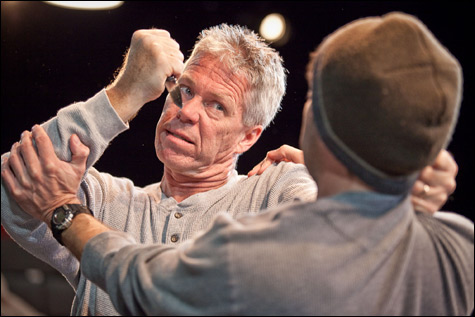
MENACE AND MORE: Bobby, with the knife, looks set to make Frankie the play’s first casualty. |
The title of Israel Horovitz's Sins of the Mother (through September 13 at Gloucester Stage) is an ironic misnomer. The first act is set in the deserted union meeting hall of a mostly defunct Gloucester fish-processing plant where out-of-work locals come every week to have their unemployment cards signed. Here we learn of a sinister, unexpected link between the long-dead mother of young Douggie Shimmatarro (Francisco Solorzano) — who's back in town after having moved away as a teenager — and middle-aged Bobby Maloney (Robert Walsh). Their connection goes back to the '70s, when heavy drug taking was rampant in the desperate, dead-ended lives of the young Gloucester fishermen. But though Douggie's mother is initially identified as the source of the tragedy, the true sinner, as we find out in the first act, is the off-stage father of Frankie Verga (Christopher Whalen), another of the men who hang around the plant waiting for the office to open.
Sins of the Mother is Horovitz's contemporary take on Ibsen's Ghosts, with AIDS substituting for syphilis. But for a while Horovitz, who also directs this production, treats the dramatic coincidences as a grim joke on the ensconced, incestuous nature of the community. Bound up with that joke is a recurring gag: all three of the men Douggie encounters — the third is Dubbah Morrison (David Nail), a contemporary of Frankie's — think that Douggie must belong to one of two other local Shimmatarro families. The repetition of this error and the profane banter among Bobby, Frankie, and Dubbah — familiar, jocular, with an undercurrent of menace — suggest Pinter by way of David Mamet. And it's quite entertaining, largely because of the energy and conviction of the three actors. Walsh is especially persuasive as the hard-bitten Bobby.
But the play is a melodrama at heart, and whenever Horovitz shifts out of hard-boiled comedy, it becomes maudlin. All four actors have to break down on stage at some point, and not one of them succeeds. You wonder that the astonishingly prolific Horovitz couldn't have found a way around all this bathos, and that the tonal switches are so abrupt and clumsy, as if he were flicking a light on and off. By the end, there have been three deaths, two of them violent, and though the eulogies we hear delivered for the last of the deceased are in the black-comic mode, Horovitz doesn't trust that style to carry him through. He wants the interjection of murder to be both shocking and funny, but he suspends the humor whenever he wants to get serious.
Perhaps it's the play that strands them, but by the second half the actors have pretty much run out of ideas. When, six months later, Bobby, Douggie, and Dubbah reassemble at Bobby's home, their interaction more or less replays what we saw in the first act. The difference is that now Whalen shows up as Frank's estranged twin brother, Philly, who runs a lucrative car dealership on the South Shore. At first, Whalen's impersonation of this moneyed boor, who wears shades even inside (another running gag that grows tiresome) and affects a complacent pop spirituality, is amusing, but it isn't very convincing. And though the circumstances of Frankie and Philly are vastly different, Whalen reads both sets of lines in the same sarcastic tone. I assume he wanted to underscore the link between these identical twins, who hate each other with equal intensity, by giving them the same vocal quality, but sarcasm is always a poor acting choice. Philly wears out his welcome long before the second act is over.